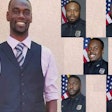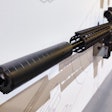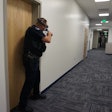I've always been curious as to what drives men and women to become cops. When I've had opportunities to ask them the question, many simply said that they knew early on that they wanted to be a police officer. If any particular inspiration was to be found, it was often a family member who paved the way in law enforcement, or some cop icon of screen or television. It wasn't uncommon to hear names like Reed, Malloy, or Jack Webb pop up in conversation.
But for others it's often a singular childhood incident that had a profound effect on their impression of law enforcement officers—and ultimately on their decision to become one.
One recalled having become separated from his parents at a drive-in theater swap meet. Embarrassed and fearful, the boy finally decided to reach out to the only stranger he felt comfortable approaching: a police officer. The officer got him a bag of popcorn and kept the boy company until such time as the staff's public service announcements got the attention of his parents who responded to the snack bar.
Another was a little bit older when he and a few of his buddies got a little too rambunctious during a Halloween night pumpkin fight. Rather than coming on super strong with the kid, the responding officer simply gave him a cost-benefit analysis of where such activities could ultimately lead and suggested that he might be better off going to bed at home than in jail.
A third said that he'd fallen through a plate glass window at the age of six, severely lacerating his leg. The first person to get to his house was a deputy. The deputy let him know that it was okay to cry, then took the time to calmly explain that they were going to go to the hospital where the boy would be treated and get well. The deputy even got him laughing by parodying how much worse he would have handled the situation if the tables had been reversed and he was the one cut and crying.
It was a patrolman's traffic stop of his father that imbued itself on the memory of yet another deputy. Not yet five years old and terrified that his father was about to be taken off to jail, he began to cry. The highway patrolman took the time to gently calm him down and explain the many reasons why an officer might have contact with a child's parents, none of which had anything to do with the parents ending up in jail, or even with so much as a traffic ticket.
In each instance, the child came away with a good impression of the officer, sometimes in stark contrast to what he anticipated. That a stranger would go so far out of his way to offer words of comfort and counsel instead of chastisement and condemnation left each child wanting to do as much for others.
But there have been other officers whose memories are no less indelible, though far less pleasant. A fellow sergeant once told me that he would never forget the California Penal Code for Receiving Stolen Property since he'd been accused of it as a young teen. The accusation wasn't an isolated one, although it came from an isolated source: A deputy who let the young man know that he had his number and was going to bust his ass, sooner or later. As the contacts happened in an era where racism wasn't quite so under the radar, the deputy wasn't shy about the reasons for his belief.
The sergeant paused while telling me the story, and I could tell he was having difficulty keeping his emotions in check about a memory that still resonated with him.
"He assumed that because I was black, that I was as stupid as some of my peers who were screwing up," he recalled. "It wasn't the first time I'd encountered racism, but it was one of the most hurtful because I'd been taught to respect the law—and yet it wasn't respecting me."
Like the others, the sergeant's experience with a law enforcement official had affected him, albeit differently. Whereas the others wanted to grow up to become like the men and women that they had contact with, he wanted to grow up to become something different. For him, it was a matter of if you can't beat them, join them—then effect change from within.
So the next time you go in service, ask yourself: What kind of impression will I make—and how might it resonate years from now?













